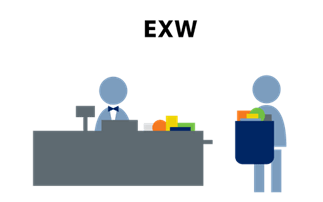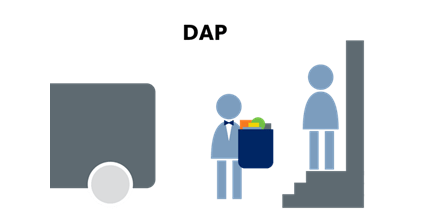What Incoterms® are and how they affect liability and the need for insurance
When buying, selling or shipping goods globally, you need to understand Incoterms®. They affect the responsibilities of the different parties involved and your need for any insurance in the event of unforeseen incidents.
International shipments can seem quite complex. You need to deal with customs clearance, know how to handle dangerous goods, or complete the correct documentation. If something gets overlooked, it is important to determine who is liable for the goods during each stage of the shipment.
When buying, selling or shipping goods globally, you need to understand what are known as Incoterms®, the rules for global trade set out by the International Chamber of Commerce (ICC). They affect the responsibilities of the different parties involved and your need for any insurance in the event of unforeseen incidents.
What are Incoterms®?
Incoterms® regulate the buying and selling of goods, and set out the responsibilities of buyers and sellers operating in the international trade system. They define who has control (possession) and who bears risks during the process of transporting goods from seller to buyer.
First introduced in 1936, Incoterms® are updated every 10 years. They are recognised by the United Nations Commission on International Trade Law (UNCITRAL), the governing body for international trading law, as the global standard. The most recent edition is Incoterms 2020.
Why Incoterms® matter
The Incoterms® that apply in each case are agreed contractually between the seller and the buyer of the goods. They clearly delineate when control and liability (risk) switch from one to the other. Some common Incoterms are:
- EXW: Ex-Works
- DAP: Delivered at Place
- DDP: Delivered Duty Paid
- CFR: Cost and Freight
- CIF: Cost, Insurance and Freight
Note that Incoterms do not define ownership. They only define when possession, control and risk transfer from seller to buyer.
How to work with Incoterms
Know the timing
As control, possession and liability do not necessarily transfer from seller to buyer simultaneously, it’s important to be aware of when you take on or hand over risk, in other words, when the responsibility for insuring the goods transfers to you from the other party in the transaction, or vice versa.

For example, if the Incoterm agreed is Ex-Works (EXW), then liability for the goods transfers at the seller factory or premises as soon as the goods are ready for pickup. The fact that the buyer arranges pickup two days later, or that delivery to buyer takes place several weeks later after a long sea voyage in a container, has no effect on the transfer of risk and liability, and thus need to decide whether to insure the goods.
Ex-Works is similar to buying something in a shop. The buyer takes on liability and control in the actual shop, although legal ownership might not immediately transfer to the buyer if the buyer makes a credit agreement to pay later.

At the other end of the scale are Delivered at Place (DAP) and Delivered Duty Paid (DDP). With both of these, transfer of control and risk take place at the buyer’s premises only once the goods are unloaded, in other words, at the same time as the buyer takes delivery of the goods. Thus, it is the seller who has to arrange insurance all the way to that point.
Delivered at Place is similar to ordering something for delivery to your home. You are paying for delivery, and you expect the seller to be liable for the goods until they are safely delivered to you.
Make sure the Incoterm you choose fits your logistics
As with any deal, the terms you can negotiate ultimately depend on how significant a customer or supplier you are to the other party in the transaction. You may have to accept the terms, or you may be able to get something more favourable.
Be careful not to get Incoterms that hinder your business. For instance, Ex-Works (EXW) means that you are responsible for arranging all freight and bearing all risks once the supplier has made the goods available to you at its premises. If you want to control the supply chain from that point on, then it could be a good solution for you. However, you will effectively be using the supplier’s factory loading areas as extra warehouse space – and will need an additional agreement about when goods have to be collected.
Ex-Works is common in the automotive industry, where just-in-time and just-in-sequence manufacturing mean that automotive manufacturers want as much control as possible over suppliers in the chain. Another Incoterm may be prevalent in your industry. Other points to consider are:
Be specific about the place
Be as specific as possible. The name of a city or port may not be enough. A supplier might deliver to a dockside or airport in the city named, while buyer might be expecting delivery to door.
Think about duty and customs
Be clear about who pays for duties and customers clearance. With Delivered Duty Paid (DDP), it is the seller who pays. With Cost and Freight (CFR) and Cost, Insurance and Freight (CIF), it is the buyer who pays. CFR and CIF mean that the goods will be unloaded from the plane or ship at the airport or port of arrival, at which point the risk transfers to buyer.
Ownership does not mean liability
Incoterms make no mention of ownership, strange as it may seem. They only define when possession, control and risk transfer from seller to buyer.
Understand when insurance is needed for each Incoterm
This infographic shows when risk (orange bars) and insurance (green bars) transfer from seller to buyer for each Incoterm.
As you can see, they both transfer simultaneously, except with Carriage and Insurance Paid to (CIP) and Carriage, Insurance and Freight (CIF). In both these cases, the seller pays for insurance as far as an agreed place – either the final destination or the port of loading.
Note that the last four Incoterms in the table (in light blue) only apply to transport by sea or inland waterway.
Buying insurance needs to be an informed choice. Understanding who has liability simply indicates which party needs to decide if they want insurance.
For more details on carrier and freight forwarder liability, and the factors to consider when deciding about insurance, see our expert insights on what cargo insurance covers and when you need it.
Incoterms may seem complex, but become quite straightforward once you get used to them, especially the more frequently used ones. The key to successful import and export is to agree the most appropriate Incoterms for your business and circumstances.
Make sure that you know which Incoterms apply, which you prefer when negotiating, and that your cargo is adequately insured. Speak to our experts about the appropriate Incoterms for your industry and shipments.
Any questions?
Our experts are ready to help. Get in touch and we'll find the solution you need.


